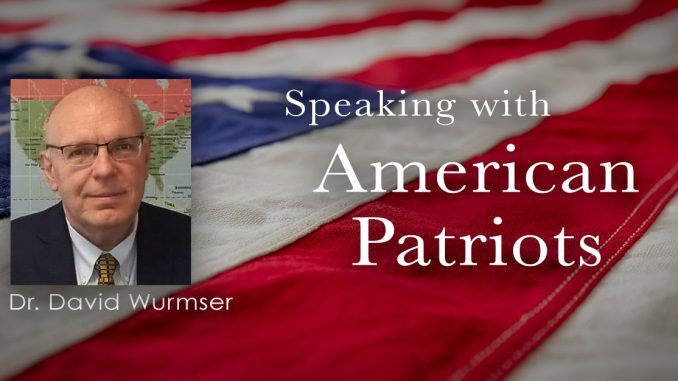AMERICA’S FUTURE
Dr. David Wurmser served in the Donald Trump and George W. Bush administrations. He is a Senior Analyst for Middle East Affairs at the Center for Security Policy and the executive and founding member of the Delphi Global Analysis Group, LLC – a firm specializing in geopolitical risk analysis and mitigation for infrastructure, high-tech, defense and financial firms from the United States, Japan, and India navigating in Israel.
Dr. Wurmser’s military service includes 11 years of intelligence experience in the U.S. Navy Reserves, reaching the rank of Lieutenant Commander. He was mobilized during Operation Vigilant Warrior following Iraq’s surge toward Kuwait in 1994 to serve on the Defense Intelligence Agency’s Iraq Intelligence Task Force. He is the recipient of the prestigious Defense Meritorious Service Medal. He holds a Ph.D. on U.S. foreign policy and Middle East affairs from the Johns Hopkins University.
Recently we spoke with him to get his insight on U.S. foreign policy in the Middle East and Israel’s recent operations targeting the Lebanese terrorist group Hezbollah.
Big news in the Middle East this week is the Israeli operation that booby-trapped Hezbollah’s electronic devices and hobbled the terror organization. Since Hezbollah has kidnapped, tortured, and murdered Americans, why isn’t the U.S. targeting this Iranian proxy as aggressively?It indeed is a travesty that the United States hasn’t taken the lead in pursuing the killers of more Americans than any terror group other than perhaps al-Qaeda. This fault captures the foreign policy consensus within the Washington establishment that regards the Iranian regime as authentic, popular, and reformable — even though the historic record shows it couldn’t be less so on all counts. The Washington establishment is welded to profoundly flawed assumptions, which are codified into a relentless but futile attempt of appeasement to find the holy grail of regime “moderates” and persistent Iranian manipulation of that delusion.
Why are America’s traditional Middle East allies like Israel and Saudi Arabia frustrated with the current White House?
Traditional allies soberly face the existential threat posed by an Iranian regime that does not hide its imperial, indeed global, ambitions nor its or its proxies’ grotesque and depraved viciousness, relish for inflicting pain and torture, and dehumanization of all that stand in its way. So when the United States imagines that only by accommodating Iran can Washington advance regional stability, regional allies instinctively recoil in horror. The current administration, which clearly seeks such a strategic arrangement with Tehran paid for by abandonment of our regional allies, leaves our regional allies facing a potentially fatal challenge alone and left to scramble in despair for any power that can provide a lifeline.
Why is the Middle East a region of vital U.S. interest?
A proper constellation of fully supported powerful regional allies can anchor U.S. interests with modest investment. U.S. interests are many, protecting the key arteries of international maritime and land trade between Asia and Europe, the immense energy resources upon which the industrial world depends, and in Israel, one of the most concentrated high-tech economic innovation hubs upon which the modern economy now depends. Moreover, the survival of Christianity in the cradle of its birth and Judaism in its home anchors the spiritual foundations of Western civilization.
What does the next President have to do to stabilize the Middle East?
The next President should prioritize allowing Israel to achieve a decisive victory by destroying Hamas and Hezbollah so that Israel emerges as a confident, strong horse around which the Abraham Accord alliance can expand and deepen and best anchor U.S. regional interests with minimal investment. This will isolate and destabilize so thoroughly the Iranian regime that it moves toward collapse and opens the door for a potential post-Islamic Revolutionary Regime that enters an alliance with Israel. A new way forward for Washington includes abandoning the decades-long failed policy of a two-state solution and examining new options, including the emergence of a cross-Middle East land bridge trade corridor anchored to the UAE and India in the east and Israel and Greece to the west to supplement or even transcend Suez Canal limitations. It would encourage Israel, Cyprus, and Egypt to build a robust East Mediterranean hydrocarbon production zone and tie that zone to transmission structures for Persian Gulf gas and oil to reach Europe. It would further facilitate the emergence of a post-Hezbollah eastern Mediterranean that restores Lebanon as a proper homeland and beacon for the region’s Christian communities and allows for the emergence of several autonomous entities to replace the defunct Syrian state that can protect the independence of other minorities across the Fertile Crescent.
What is your prayer for America?
I pray the United States rediscovers its foundation as the leader of Western civilization, the embodiment and beacon of Judeo-Christian culture, and the defender of the continued advance of human freedom. And I pray that the American people find the inner strength to demand of their leaders the wisdom to uphold this sacred trust built on the great sacrifice, astonishing moral fiber and brilliant vision of four centuries of generations of Americans.




Leave a Reply
You must be logged in to post a comment.